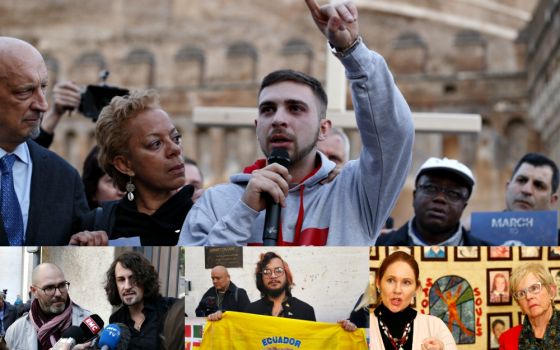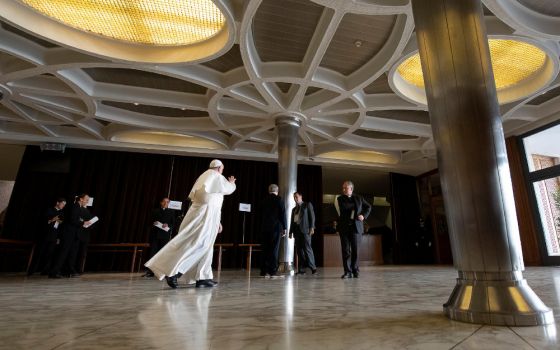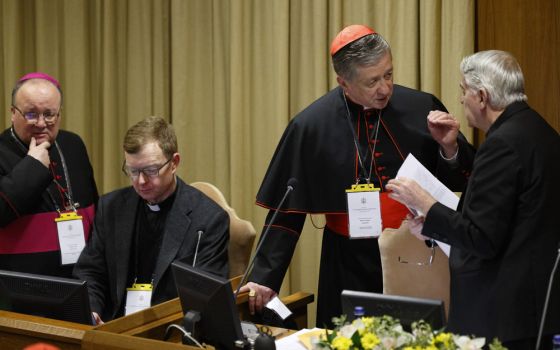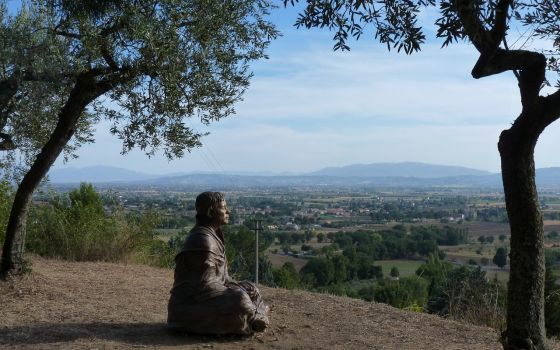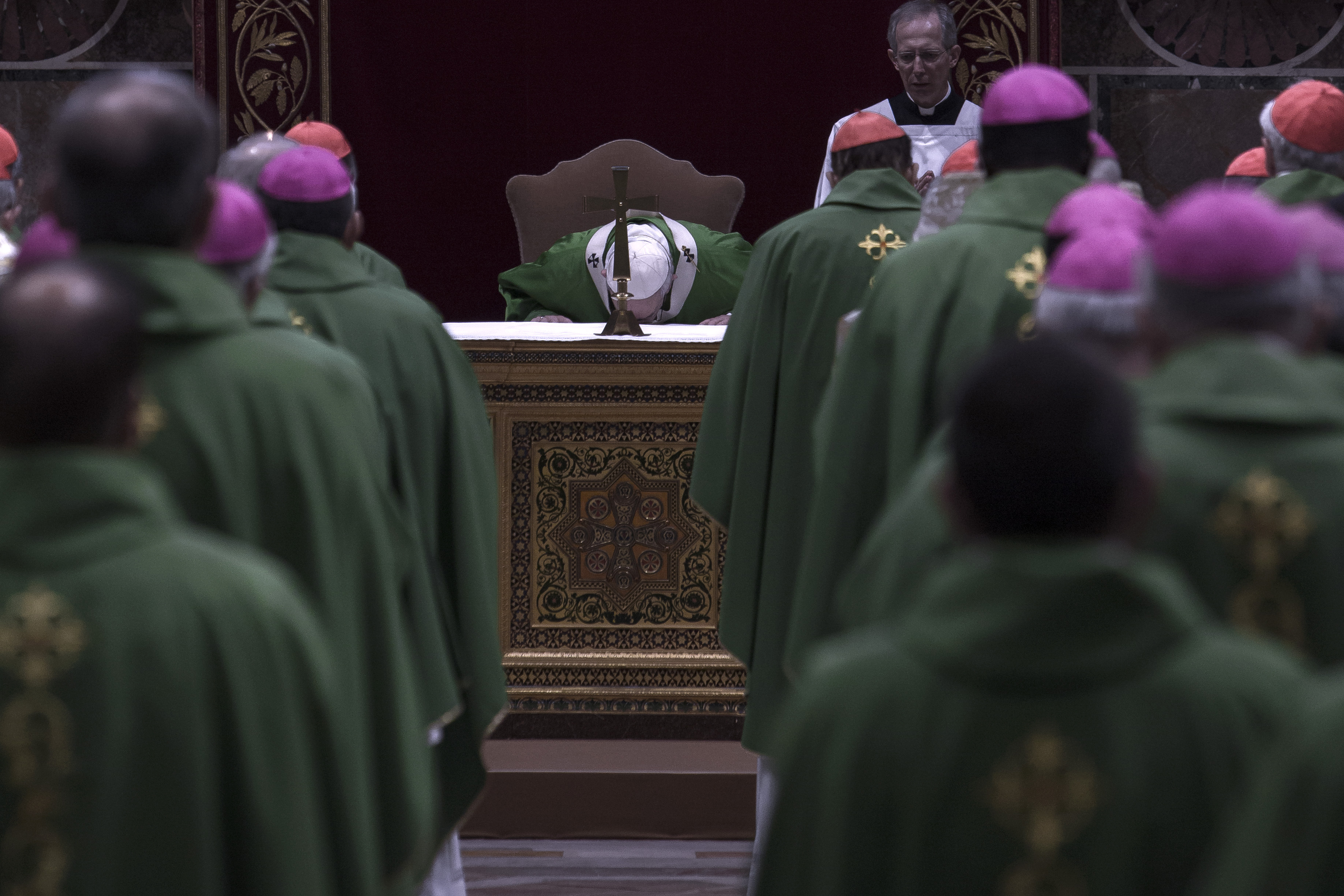
Pope Francis kisses the altar during a Mass with the heads of bishops' conferences from around the world on the last day of the four-day meeting on the protection of minors in the church at the Vatican Feb. 24. (CNS/Maria Grazia Picciarella)
I hope the naysayers will be as public in admitting the success of the Vatican summit last week as they were beforehand in predicting its failure. As far as I can tell only Religion News Service's Mark Silk and I predicted, in advance, that the meeting would constitute a large step forward. I admit, now, that my expectations were actually exceeded.
I was not alone. Boston Cardinal Sean O'Malley, one of the meeting participants and the prelate who, more than any other, has been on the frontlines of the fight against clergy sex abuse, told me Sunday that he thought the meeting had been a success.
"To my knowledge this is the first time this kind of a conference is taking place in the church," O'Malley said in an email. "The participants are all very pleased with the format, the content, the focus and the atmosphere among the bishops. The message of the Holy Father could not be clearer. The follow up is crucial, but this could be for the universal church what the Dallas charter was for the United States, a real game changer."
You knew something was afoot when the organizers announced that parts of the meeting would be livecast. And that a website had been created to post the major talks. You also knew that the organizers understood the crux of the problem was changing the clerical and hierarchic culture when the agenda was announced and an entire day was dedicated to accountability and another to transparency. It was the absence of those two traits that most characterized the decades of cover-ups under St. Pope John Paul II.
It was easy, especially here in the United States, to forget that the fact of the meeting itself was a significant step forward. It was unprecedented to gather the presidents of the world's episcopal conferences together on relatively short notice to address a specific problem. Synods take years of planning, but Pope Francis clearly did not want to wait. His impatience with finding solutions is the strongest card that can be played in the world of the Catholic hierarchy.
And then, the Holy Father opened the meeting by saying he had not convoked the unprecedented gathering so that "simple and predictable condemnations" of abuse could be issued. He wanted "concrete measures." He repeated: "We need to be concrete." As if to dramatize the point, as he spoke, assistants distributed 21 "reflection points" to the assembled bishops. The message was clear: We are here to accomplish something real and, in preparation, we have some points to focus the conversation.
Later that morning, Maltese Archbishop Charles Scicluna doubled down on the need for episcopal accountability. "The faith community under our care should know that we mean business," Scicluna told the assembly. "They should come to know … we will protect them at all costs. We will lay down our lives for the flocks entrusted to us."
The organizing committee and the pope had done their advance preparation and the 21 points clearly showed the kind of response wanted from all the bishops' conferences in the world: clear and easy to understand information for those seeking to file an accusation; training of all church personnel, procedures involving competent laity to investigate allegations, etc. The points also displayed a pastoral focus that had been completely lacking from the proposals put before the U.S. bishops at their November 2018 meeting and which the Vatican, rightly, scotched. Some seemed too ambivalent for critics, but on the whole, if taken to heart, they were a fine roadmap for the universal church going forward.
Advertisement
Chicago Cardinal Blase Cupich's speech on day two of the meeting focused on accountability and synodality and one of the key paragraphs came right near the beginning:
A process that merely changes policies, even if it is the fruit of the finest acts of collegiality, is not enough. It is the conversion of men and women throughout the entire Church — parents and priests, catechists and religious, parish leaders and bishops — and the conversion of ecclesial cultures on every continent that we must seek. Only a synodal vision, rooted in discernment, conversion and reform at every level can bring to the Church the comprehensive action in the defense of the most vulnerable in our midst to which God's grace is calling us.
The phrase "conversion of ecclesial cultures" is what is needed. I can't count the many articles and editorials has NCR published over the years that have said, in essence, "it's the clerical culture, stupid." To hear it from a cardinal, standing next to the pope, at a meeting like this was not nothing.
Cupich went on to delineate four principles to guide the transformation of ecclesial culture: radical listening, lay witness, collegiality and accountability. And he did not leave the issue at the level of principles but suggested some practical, institutional, legal and structural approaches that might achieve them. He reiterated his proposal that allegations against a bishop could be brought to the review board of the metropolitan archbishop, which review boards would consist of both lay and clerical members. This is key: There must be lay people as well as clergy, people with an independent reputation at stake, who will blow the whistle if there is any attempt at a cover-up.
The emotional high point of the event surely came with the speech by Society of the Holy Child Jesus Sr. Veronica Openibo. She did not mince words: "At the present time, we are in a state of crisis and shame. We have seriously clouded the grace of the Christ-mission. Is it possible for us to move from fear of scandal to truth? How do we remove the masks that hide our sinful neglect?"
She offered personal testimony to the fact that sex abuse is not a problem only of the global north. Sister Veronica also addressed, head-on, the clerical culture: "Essential, surely, is a clear and balanced education and training about sexuality and boundaries in the seminaries and formation houses; in the ongoing formation of priests, religious men and women and bishops. It worries me when I see in Rome, and elsewhere, the youngest seminarians being treated as though they are more special than everyone else, thus encouraging them to assume, from the beginning of their training, exalted ideas about their status." It worries me too.
This focus on clerical culture is important not least because there is a new attempt to obfuscate the crisis by making homosexuals the scapegoats of the clergy sex abuse crisis. There are no serious studies that support the idea that homosexuality is a risk factor in determining who might become an abuser. And, more importantly, the sin and crime of sexual abuse will stalk the human race as long as we have breath. It is the covering up of that abuse, the disposition to sympathize with the perpetrator and not the victim and the bastardization of the theological idea of scandal that turned this into a crisis. The pope's closing message emphasized to all with ears to hear that he expects real change, not empty promises.
If it seems clear the presidents of the world's bishops' conferences got the message, it is less clear to me that the heads of the Roman dicasteries did. It is imperative that the four congregations charged by Francis' apostolic letter "Like a Loving Mother" with holding bishops accountable for negligence about protecting minors publish the protocols and procedures by which that accountability will be exercised.
It is almost two years since "Like a Loving Mother" was published and still no one knows: Have any bishops been brought to justice under the terms of that document? By what policies and protocols? Have new canons been recommended so that the procedures and protocols are clearly known? Has a case been opened against, for example, Bishop Richard Malone of Buffalo, New York, about whom there have been credible allegations of negligence? If not, why not? What role do nuncios play in this process? This will be the first test of this meeting's success going forward: Will the curial congregations publish their policies or protocols and disclose the cases they are currently handling? Francis: If you are reading this, every Saturday when you meet with Canadian Cardinal Marc Ouellet, prefect of the Congregation for Bishops, ask for those protocols and don't stop until you get them.
This focus on clerical culture is important not least because there is a new attempt to obfuscate the crisis by making homosexuals the scapegoats of the clergy sex abuse crisis.
Various news outlets have reported that victims' advocacy groups were unsatisfied with the meeting and are proposing certain courses of action. I thought that one of the strengths of the meeting was the repeated insistence by every presenter, and by the inclusion of victims throughout, that the leaders of the church understand there can be no progress in addressing this mess unless victims are heard. It is precisely the visceral testimony of the victims that prompts conversion of heart and makes the demands of justice crystal clear.
But, we should not look to victims' advocacy groups to determine ecclesial policy. It was clear from this meeting that the church's leaders understand the church is itself on trial. And, just as at a trial, the victim must be heard, and in many jurisdictions, a victims' family is afforded the opportunity to address the court before sentence is imposed, the prominent role victims played in this meeting should be seen as a touchstone for any and all reform efforts. The church must accompany the victims and, what is more, the victims must accompany the church. They must be an integral part of the process. But, a victim or a victims' family does not displace the judge in a trial and cannot replace the role of bishops in changing the clerical culture.
What? Are the bishops still the ones to judge themselves, with the pope determining the final judgment? Yes. In a civil trial, if a judge is somehow implicated or biased on the issues at work in a given case, they must recuse themselves. That does not mean all judges have to recuse themselves. When the sex abuse scandal hit Pennsylvania State University, the courts played a role in prosecuting crimes, but it was still up to the university's officials to fire who needed to be fired, hire new people committed to zero tolerance of sex abuse and demonstrate to the school's various constituencies that they had cleaned up their act. The district attorney did not fire Joe Paterno nor hire his replacement nor enact new policies and procedures at the school.
The bishops of the church made this mess and they must be the ones to clean it up. There is a place for lay involvement. There must be clear procedures of accountability and transparency. But, the bishops cannot farm out the reforms — structural, legal and spiritual — that are needed. They must lead them. The past few days such leadership seemed evident and determined. Much remains to be done and it is up the pope to make sure it gets done. I am betting Francis will do it.
[Michael Sean Winters covers the nexus of religion and politics for NCR.]
Editor's note: Don't miss out on Michael Sean Winters' latest: Sign up and we'll let you know when he publishes new Distinctly Catholic columns.





